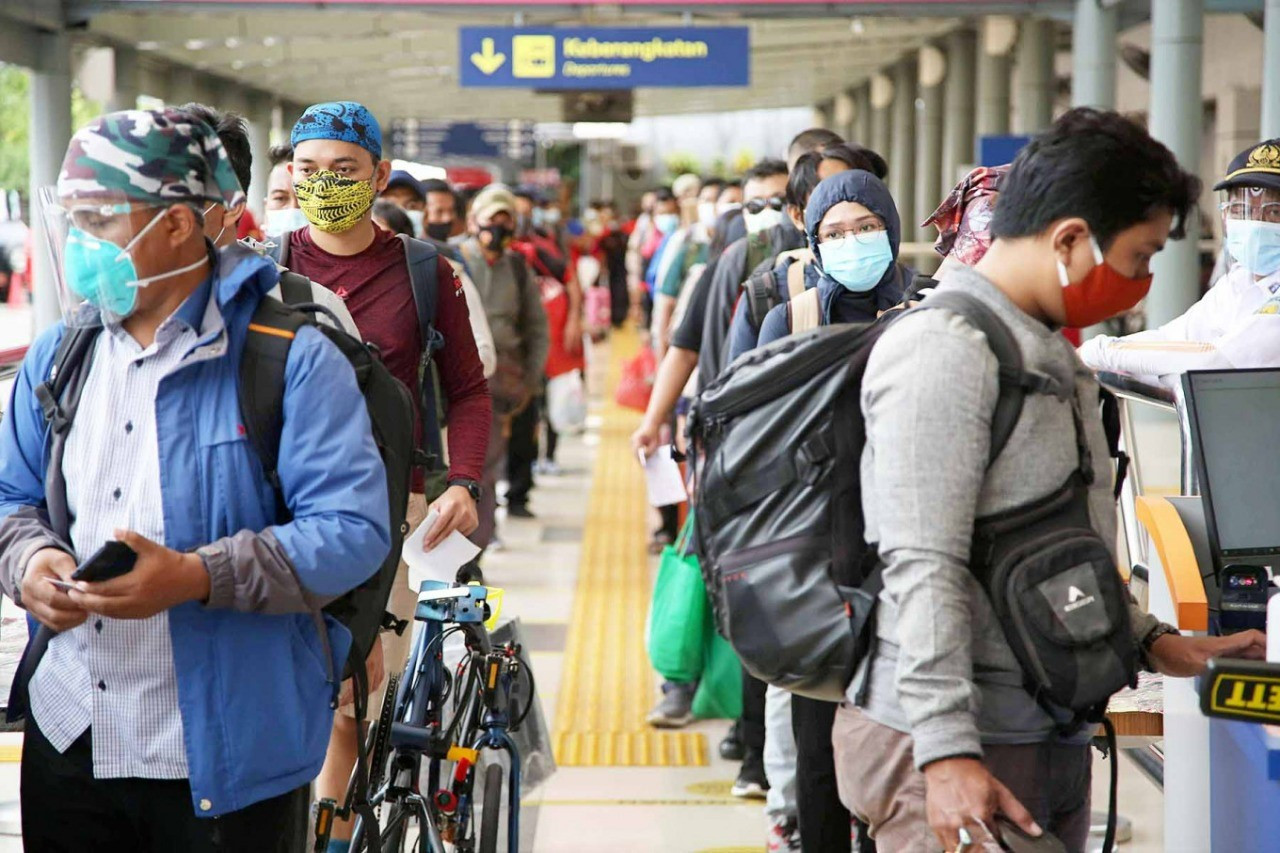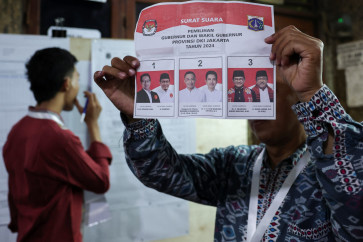Popular Reads
Top Results
Can't find what you're looking for?
View all search resultsPopular Reads
Top Results
Can't find what you're looking for?
View all search resultsOmicron discovery could delay economic recovery
Economists have long warned of such an eventuality, but the odds have risen, as the Health Ministry announced on Thursday Indonesia’s first confirmed case of Omicron.
Change text size
Gift Premium Articles
to Anyone
A
fter reporting the country's first known case of the Omicron variant of the coronavirus, the government has declared its readiness to retighten curbs if necessary, a move that would likely slow down — but not halt — the nation's economic recovery.
Coordinating ministers said last week that the government would tighten public mobility restrictions (PPKM) should a spike in COVID-19 cases overwhelm the healthcare system, and that this would have knock-on effects on economic activity.
Economists have long warned of such an eventuality, but the odds have risen, as the Health Ministry announced on Thursday Indonesia’s first confirmed case of Omicron, a variant that seems to be more transmissible but less deadly than its predecessors.
“The development of the Omicron variant will be the key to economic recovery in 2022. If Omicron were to result in significant hospitalization and the current vaccines were to lose their potency, the recovery would be slower than expected," Coordinating Maritime Affairs and Investment Minister Luhut Pandjaitan said on Thursday.
New studies have found that COVID-19 vaccines appear to offer significantly less protection against the Omicron variant but that a booster dose restores much of the protection.
Economists generally expect Omicron’s economic impact on Indonesia to be nowhere near as bad as the previous two waves, citing the country's room for emergency response measures and its preparedness after dealing with previous waves.
But they also say that tightened PPKM would weaken consumer spending and that things could worsen depending on what medical experts learn about the new variant and how other governments respond over the coming months.
Rully Arya Wisnubroto, a senior financial market analyst at state-owned Bank Mandiri, noted that besides the pandemic, Indonesia faced other macroeconomic risks, such as soaring global inflation, rate hikes abroad and a slowdown in China’s economic growth.
“We see that uncertainty is still high, [but] the probability of continued economic growth is still quite [high],” he told The Jakarta Post on Friday.
Bank Mandiri expects Indonesia’s GDP to grow 5 to 5.5 percent next year.
Gas and brakes
Since July, the government has had a four-tiered PPKM system in place that requires each city or regency to enforce restrictions based on the local level of risk, with level 4 being the most stringent.
These levels are set based on positivity rates, hospital bed occupancy, new cases, death figures and vaccination rates.
Even before the first Omicron case was detected, the government had announced plans to temporarily tighten PPKM nationwide in late December and early January, hoping to prevent a case surge during the Christmas and New Year holidays.
Read also: COVID-19 vaccination rates now part of PPKM level assessment
“We will watch the situation. If we see a spike or curve, we will hit the brakes. But if cases are flat, we will hit the gas,” said Coordinating Economic Affairs Minister Airlangga Hartarto on Dec. 15, the day before case one was announced.
He said the government would focus on speeding up the jab drive to reach an 80 percent vaccination rate by March 2022, which would make Indonesia “relatively protected from the variant.”
As of Friday, some 72 percent of Indonesians had had a first vaccine dose, while 51 percent had received a second one, Health Ministry data shows.
Health Minister Budi Gunadi Sadikin said on Thursday that the government also planned to expand its booster vaccination program and double down on genome sequencing.
The Transportation Ministry, also on Thursday, said it would closely monitor the observance of prevailing health rules in all modes of transportation, both domestic and international, and at points of entry.
Downside risks
Indonesia expects its economy to largely return to pre-pandemic conditions in 2022, as indicated by a GDP growth target of 5.5 percent outlined in the state budget. That compares to the 4.5 percent expected for this year and a 2.07 percent contraction recorded last year, when the first wave of the coronavirus hit the country.
GDP was up by an annual 3.51 percent in the third quarter of this year, proving overly optimistic the government’s forecast of 4.5 percent, as curbs were tightened in response to the Delta variant-fueled second wave.
“Omicron can be a threat if not mitigated by the government,” Josua Pardede, chief economist at publicly listed Bank Permata, said on Friday.
However, he expected the Omicron variant to have a very limited impact on fourth-quarter GDP growth, arguing that it was unlikely that the government would tighten the PPKM beyond what had already been planned for the year-end holidays.
Josua estimated that GDP growth would fall between 4.75 and 5.25 percent in the fourth quarter of this year, driven by investment and consumer spending, with the trade surplus narrowing in line with rising imports as factory activity resumed, and lower exports as global commodity prices normalized.
Center of Economics and Law Studies (CELIOS) director Bhima Yudhistira estimated that tightened PPKM would slow down annual GDP growth to 1 to 2 percent in the first quarter of 2022 due to delayed consumer spending and supply chain disruptions.
However, he predicted Indonesia would reach 4.5 percent economic growth in the fourth quarter of this year, partly because of the base effect and thanks to strong exports.
“This is reasonable, considering that last year, there was no commodity boom and social restrictions were tighter,” he said.










